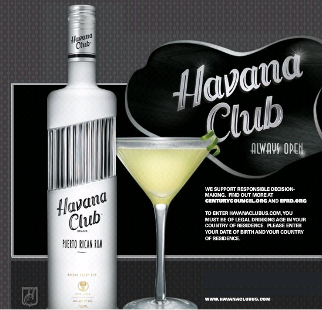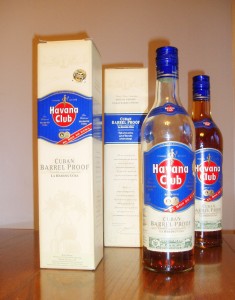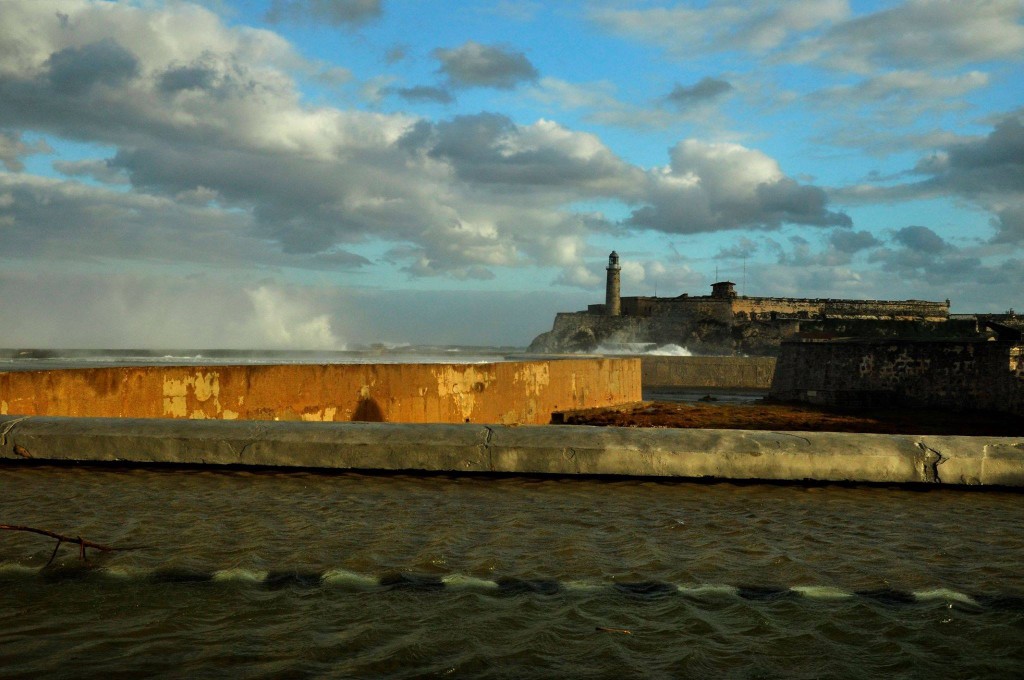THE WAR OF RUM, THE STRUGGLE CONTINUES FOR THE BRAND “HAVANA CLUB”..
Cuba wins in the United States the latest battle in the “war of rum.” And Trademark Office granted US Patent Havana Club trademark to a Cuban firm. Bacardi said it would take “all necessary legal action” against the decision.
Despite the beginning of a new era in relations between Havana and Washington, still no thaw in terms of rum they are concerned. At least between a Cuban-French company and Bacardi, the largest seller of this distillate in the world and owned by Cuban exiles. The last chapter of confrontation, by the use of the name “Havana Club” in the US, lived last week.
The Office US Patent and Trademark decided on Wednesday January 13 rum that name belongs to CUBAEXPORT signature that is associated with the French Pernod Ricard. Thus, Bacardi will not sell your -produced rum in Puerto Rico with the label “Havana Club” in the US and other could do the Cuban-French company when lifting the embargo against the island.
Bacardi declared surprised at the decision and announced through a statement that it will continue with “all legal actions necessary” to defend what are they assure their “legitimate rights” Havana Club.
The history of this war extends to the early years after the triumph of the Cuban Revolution. With the arrival of Fidel Castro to power in 1960, the Havana Club rum factory of the Arechabala family was expropriated. The same happened with Bacardi, but while Cuba continued to produce Havana Club, the Bacardi rum but continued manufacturing in distilleries they already had in Puerto Rico, where strengthened its operations.
In 1973 the Arechabala lost the rights of Havana Club trademark in the United States (for failing to renew within the prescribed period) and were held by the company on the island Cubaexport since 1976. However, Bacardi did not want to leave this battle the Cuban regime, and bought the Arechabala His former competitors in Cuba the “recipe” and brand who had been his rum, even though they had lost the rights.
In 1993 the Cuban government agreed with the French firm Pernod Ricard cede the exploitation of the Havana Club trademark, through a joint venture called Havana Club Holding. However, in 1998 the US Congress changed trademark law to prevent the country could sell products under names that were confiscated by the Cuban communist regime without compensation.
For this reason the US authorities withdrew the license of Pernod Ricard had to sell the spirits manufactured in Cuba on US soil, and Bacardi went on the offensive (in 1994 had already applied for registration of the Havana Club rum brand in the US ) and soon put the US market its own Havana Club, though produced in Puerto Rico.
The battle between Havana and Washington brought face to face in this case at the World Trade Organization in August 2001 that declared illegal the US Appropriations Act of 1998.
In 2006 Cubaexport wanted to renew its rights to the Havana Club brand (a process that 10 years ago), but the Office of Foreign Assets Control (OFAC, under the US Treasury) declined that request, and he said he consulted the Department State and considered that granting the license would “go against the grain of American politics.” So Cubaexport registration expired. These were the years of the George W. Bush.
American justice upheld the green light to continue to market its own Bacardi Havana Club in the United States. This happened in 2010 when a federal judge ruled against the Cuban firm and when the Supreme Court decided not to address the case in 2012. The court and returned the matter to the Office of Patents and Trademarks, now itself decided to grant the license to Cubaexport.
“I can not explain the reasons why the Patent Office brand returned to Cuba, but many legal experts have criticized the earlier decision to deny the trademark to the Cuban government. I you would agree with those who say that the Obama Administration has given the brand back to Cuba as part of its policy of reconciliation with Cuba, “he told La Tercera, Tom Gjelten, author of Bacardi and the Long Fight for Cuba.
Although again feature the domain of the Havana Club brand to the United States, the effect of the embargo against Cuba prevents Cubaexport and Pernod Ricard to market its rum on US soil. But it is the first step so that when those restrictions over five decades are lifted and that the same Barack Obama called on Congress to end, Cuba can come to deal in the US market that accounts for 40% of sales of rum in the world.
La Tercera, Chile / Peter Schwarze / Internet Photos / TheCubanHistory.com
The Cuban History / Hollywood.
Arnoldo Varona, Editor.
EEUU/CUBA: CONTINÚA LA LUCHA POR LA MARCA DE RON “HAVANA CLUB”.
Cuba gana en Estados Unidos la batalla más reciente de la “guerra del ron”. La Oficina de Marcas y Patentes norteamericana concedió la marca Havana Club a una firma cubana. Bacardí dijo que tomará “todas las acciones legales necesarias” en contra de esa decisión.
Pese al inicio de una nueva era en las relaciones entre La Habana y Washington, aún no hay deshielo en cuanto a ron se refiere. Al menos entre una compañía cubano-francesa y la firma Bacardí, la mayor vendedora de este destilado en el mundo y propiedad de cubanos exiliados. El último capítulo del enfrentamiento, por el uso del nombre “Havana Club” en Estados Unidos, se vivió la semana pasada.
La Oficina de Marcas y Patentes norteamericana decidió el miércoles 13 de enero que ese nombre de ron pertenece a Cubaexport, firma que está asociada a la francesa Pernod Ricard. De esta forma, Bacardí no podrá vender su ron -producido en Puerto Rico- con la etiqueta “Havana Club” en Estados Unidos y sí lo podría hacer la compañía cubano-gala cuando se levante el embargo contra la isla.
Bacardí se declaró sorprendida con la decisión y anunció a través de un comunicado que seguirá con “todas las acciones legales necesarias” para defender lo que -aseguran- son sus “legítimos derechos” sobre Havana Club.
La historia de esta guerra se extiende a los primeros años tras el triunfo de la Revolución Cubana. Con la llegada de Fidel Castro al poder, en 1960 la fábrica de ron Havana Club de la familia Arechabala fue expropiada. Lo mismo ocurrió con la firma Bacardí, pero mientras Cuba continuó produciendo Havana Club, los Bacardí siguieron fabricando su ron pero en las destilerías que ya tenían en Puerto Rico, desde donde afianzaron sus operaciones.
En 1973 los Arechabala perdieron los derechos de la marca Havana Club en Estados Unidos (por no renovarlo en el plazo establecido) y quedaron en manos de la compañía de la isla Cubaexport a partir de 1976. Sin embargo, Bacardí no quiso abandonar esta batalla contra el régimen cubano, y compró a los Arechabala -sus antiguos competidores en Cuba- la “receta” y la marca del que había sido su ron, pese a que éstos ya habían perdido los derechos.
En 1993 el gobierno cubano acordó con la firma francesa Pernod Ricard cederle la explotación de la marca Havana Club, a través de una empresa común llamada Havana Club Holding. Sin embargo, en 1998 el Congreso de Estados Unidos modificó la legislación de marcas para evitar que pudiesen venderse en el país productos bajo denominaciones que fueron confiscadas sin compensación por el régimen comunista cubano.
Por este motivo las autoridades estadounidenses retiraron la licencia que tenía Pernod Ricard para vender el espirituoso fabricado en Cuba en suelo estadounidense, y Bacardí pasó a la ofensiva (en 1994 ya había solicitado el registro de la marca de ron Havana Club en EE.UU.) y en poco tiempo puso en el mercado norteamericano su propio Havana Club, eso sí producido en Puerto Rico.
La batalla entre La Habana y Washington los llevó a verse las caras por este caso en la Organización Mundial de Comercio, que en agosto de 2001 declaró ilegal la Ley de Apropiaciones estadounidense de 1998.
En 2006 Cubaexport quiso renovar sus derechos sobre la marca Havana Club (un trámite que se hace cada 10 años), pero la Oficina de Control de Activos Extranjeros (Ofac, dependiente del Tesoro estadounidense) declinó esa solicitud, ya que dijo haber consultado al Departamento de Estado y consideró que otorgar esa licencia “iría a contrapelo de la política estadounidense”. Así el registro de Cubaexport expiró. Eran los años del gobierno de George W. Bush.
La justicia norteamericana mantuvo la luz verde para que Bacardí continuara comercializando su propio Havana Club en Estados Unidos. Así pasó en 2010 cuando un juez federal falló en contra de la firma cubana y cuando la Corte Suprema decidió no abordar el caso en 2012. El alto tribunal devolvió así el tema a la Oficina de Marcas y Patentes, que ahora sí decidió otorgarle la licencia a Cubaexport.
“No puedo explicar las razones por la cual la Oficina de Patentes devolvió la marca a Cuba, pero muchos expertos legales han criticado la decisión anterior de negar la marca al gobierno cubano. Yo estaría de acuerdo con los que dicen que la Administración Obama ha otorgado la marca nuevamente a Cuba como parte de su política de reconciliación con La Habana”, afirmó a La Tercera, Tom Gjelten, autor del libro Bacardí y la larga lucha por Cuba.
Pese a que nuevamente cuentan con el dominio de la marca Havana Club para Estados Unidos, la vigencia del embargo contra la isla impide que Cubaexport y Pernod Ricard puedan comercializar su ron en suelo estadounidense. Pero es el primer paso para que, cuando se levanten esas restricciones de más de cinco décadas y que el mismo Barack Obama llamó al Congreso a poner fin, Cuba puedan entrar a lidiar en el mercado norteamericano que concentra el 40% de las ventas de ron en el mundo.
La Tercera, Chile/Pedro Schwarze/Internet Photos/TheCubanHistory.com
The Cuban History/ Hollywood.
Arnoldo Varona, Editor.








